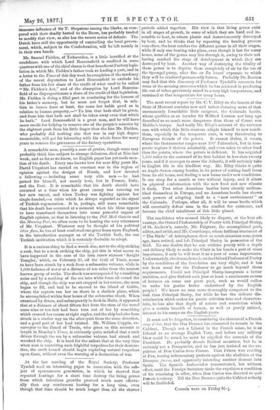The most recent report by Mr. C. V. Riley on
the insects of the State of Missouri contains new and rather alarming news of that uncommonly formidable little emigrant, the Colorado beetle, whose qualities as an invader Sir Wilfred Lawson not long ago described as so much more dangerous than those of Count von Moltke's troops. And really Mr. Riley's account of the extreme ease with which this little creature adapts himself to new condi- tions, especially in the temperate zone, is very threatening to European friends of the potato. It cannot thrive, it seems, where the thermometer ranges near 100° Fahrenheit, but in tem- perate regions it thrives admirably, and even takes to other food than the potato, where the potato is deficient. It has migrated 1,500 miles to the eastward of its first habitat in less than twenty years, and if it manages to cross the Atlantic, it will certainly take to English life in the kindliest way. Mr. Riley thinks it quite an Anglo-Saxon among beetles, in its power of cutting itself loose from its old home, and finding a new home under new conditions. It can sleep for a month or two without injury, and it alters its physical conformation with the new food and new climate it finds. Two other American beetles have already acclima- tised themselves in Europe, and no American beetle has shown such powers of adapting itself to a "new environment" as the Colorado. Perhaps, after all, it will be some beetle which will eventually defeat man in the conflict for existence, and become the chief inhabitant of this little planet.


































 Previous page
Previous page